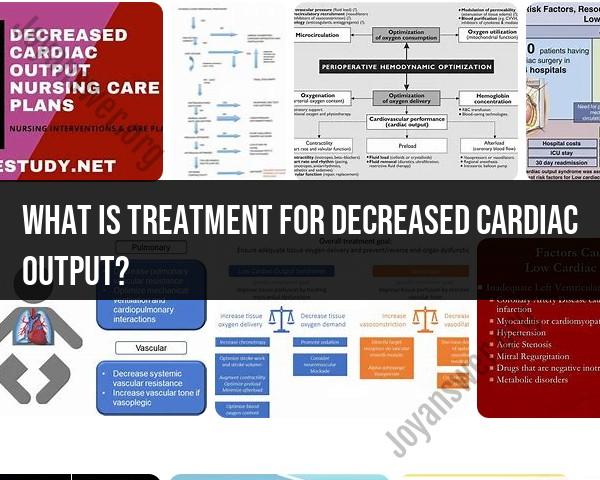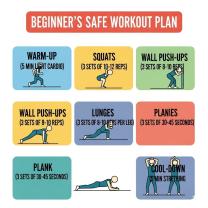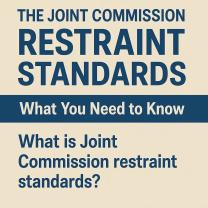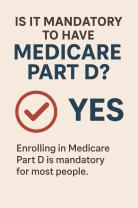What is treatment for decreased cardiac output?
The treatment for decreased cardiac output depends on the underlying cause and may involve a combination of medical interventions and lifestyle modifications. Decreased cardiac output is often a symptom of an underlying heart condition or other health issues. Here are some common medical interventions to address decreased cardiac output:
Medications:
- Inotropic Agents: These drugs can help the heart pump more effectively. Examples include dobutamine and milrinone.
- Vasopressors: In cases of low blood pressure, vasopressors like norepinephrine or epinephrine can be used to constrict blood vessels and increase blood pressure.
- Diuretics: These medications can reduce excess fluid in the body, reducing the workload on the heart. Furosemide is a common diuretic used.
- Antiarrhythmics: If abnormal heart rhythms contribute to decreased cardiac output, antiarrhythmic drugs like amiodarone or lidocaine may be prescribed.
Lifestyle Modifications:
- Diet: Reducing sodium intake can help manage fluid retention, which is common in heart conditions. A heart-healthy diet rich in fruits, vegetables, and whole grains is recommended.
- Exercise: Cardiac rehabilitation programs may be prescribed to improve heart health and increase cardiac output gradually.
- Smoking Cessation: Quitting smoking is crucial for heart health as smoking can contribute to heart disease.
- Alcohol Restriction: Reducing or eliminating alcohol consumption may be necessary, as excessive alcohol can weaken the heart muscle.
- Stress Management: Stress management techniques such as yoga, meditation, or counseling can be beneficial.
Device Therapies:
- Implantable Cardioverter-Defibrillator (ICD): This device can be implanted to monitor and treat life-threatening arrhythmias.
- Cardiac Resynchronization Therapy (CRT): CRT devices can improve the coordination of the heart's chambers in certain cases.
- Left Ventricular Assist Device (LVAD): For severe heart failure, an LVAD may be implanted to help pump blood when the heart is unable to do so adequately.
Revascularization:
- In cases of decreased cardiac output due to coronary artery disease, procedures like percutaneous coronary intervention (PCI) or coronary artery bypass grafting (CABG) may be necessary to improve blood flow to the heart muscle.
Heart Surgery:
- In some cases, open-heart surgery may be required to repair or replace damaged heart valves or to correct structural abnormalities.
Cardiac Rehabilitation:
- A structured cardiac rehabilitation program may be recommended to improve cardiovascular health through exercise, education, and lifestyle modification.
Management of Underlying Conditions:
- If decreased cardiac output is due to an underlying condition, such as high blood pressure or diabetes, effective management of these conditions is essential.
The specific treatment plan will be determined by a healthcare provider based on the individual's medical history, the underlying cause of decreased cardiac output, and the severity of the condition. It's essential to follow medical advice and treatment recommendations closely and make lifestyle changes as necessary to support heart health and improve cardiac output.
Treating Decreased Cardiac Output: Medical Interventions and Strategies
Decreased cardiac output is a serious medical condition that can lead to organ failure and death. It is important to treat decreased cardiac output promptly and aggressively.
The goals of treatment are to:
- Improve cardiac output
- Identify and address the underlying cause of the decreased cardiac output
- Prevent complications
Treatment for decreased cardiac output may include a combination of medical interventions, lifestyle modifications, and self-care.
Diagnosing and Addressing the Causes of Reduced Cardiac Output
The first step in treating decreased cardiac output is to identify and address the underlying cause. This may involve a number of diagnostic tests, such as an echocardiogram, stress test, or coronary angiography.
Once the underlying cause has been identified, treatment can be tailored to address it. For example, if the decreased cardiac output is due to heart failure, treatment may include medications such as ACE inhibitors, beta-blockers, and diuretics. If the decreased cardiac output is due to a heart attack, treatment may include angioplasty and stenting or coronary artery bypass grafting (CABG) surgery.
Medications and Therapies to Improve Cardiac Output
There are a number of medications and therapies that can be used to improve cardiac output. These include:
- Medications: Medications such as inotropes and vasopressors can be used to increase the strength and force of the heart's contractions and to raise blood pressure.
- Mechanical support devices: Mechanical support devices such as intra-aortic balloon pumps (IABPs) and left ventricular assist devices (LVADs) can be used to help the heart pump blood more effectively.
- Surgery: Surgery may be necessary to correct certain underlying causes of decreased cardiac output, such as severe heart valve stenosis or coronary artery disease.
Lifestyle Modifications and Self-Care for Heart Health
In addition to medical interventions, there are a number of lifestyle modifications and self-care measures that people with decreased cardiac output can take to improve their heart health and manage their condition. These include:
- Eating a healthy diet: A healthy diet for people with decreased cardiac output is low in salt, saturated fat, and cholesterol. It is also important to eat plenty of fruits, vegetables, and whole grains.
- Exercising regularly: Regular exercise can help to improve cardiac output and overall cardiovascular health. It is important to talk to your doctor before starting any new exercise program.
- Maintaining a healthy weight: Being overweight or obese can put additional stress on the heart. Losing weight can help to improve cardiac output and reduce the risk of complications.
- Managing stress: Stress can worsen decreased cardiac output. It is important to find healthy ways to manage stress, such as exercise, relaxation techniques, or spending time with loved ones.
Collaborative Approaches to Managing Decreased Cardiac Output
Decreased cardiac output is a complex condition that requires a collaborative approach to management. This team approach may include doctors, nurses, pharmacists, dietitians, and other healthcare professionals.
Working together, the healthcare team can develop a personalized treatment plan that meets the individual needs of the patient. This plan may include a combination of medical interventions, lifestyle modifications, and self-care.
Conclusion
Decreased cardiac output is a serious medical condition, but it is important to remember that it is treatable. By working with a healthcare team, people with decreased cardiac output can improve their cardiac output, manage their condition, and live long and healthy lives.













